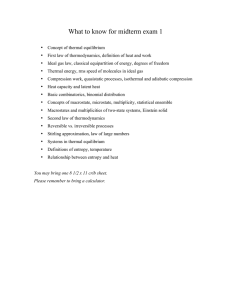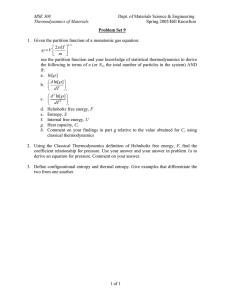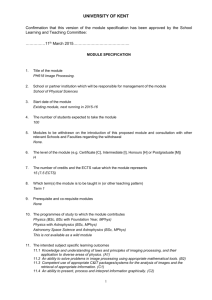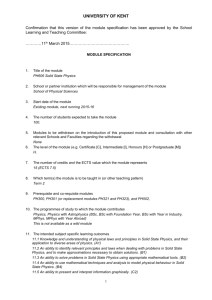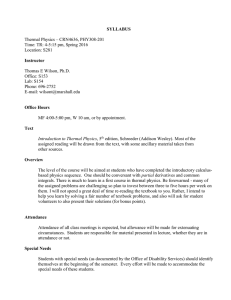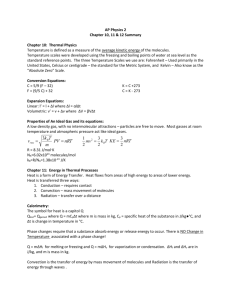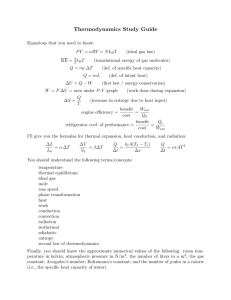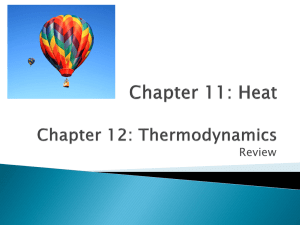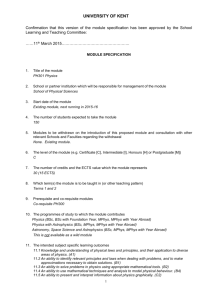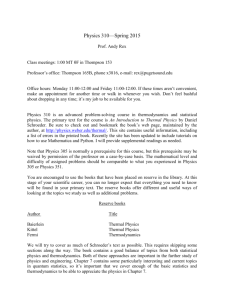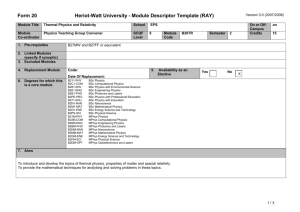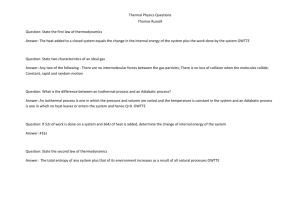module specification
advertisement
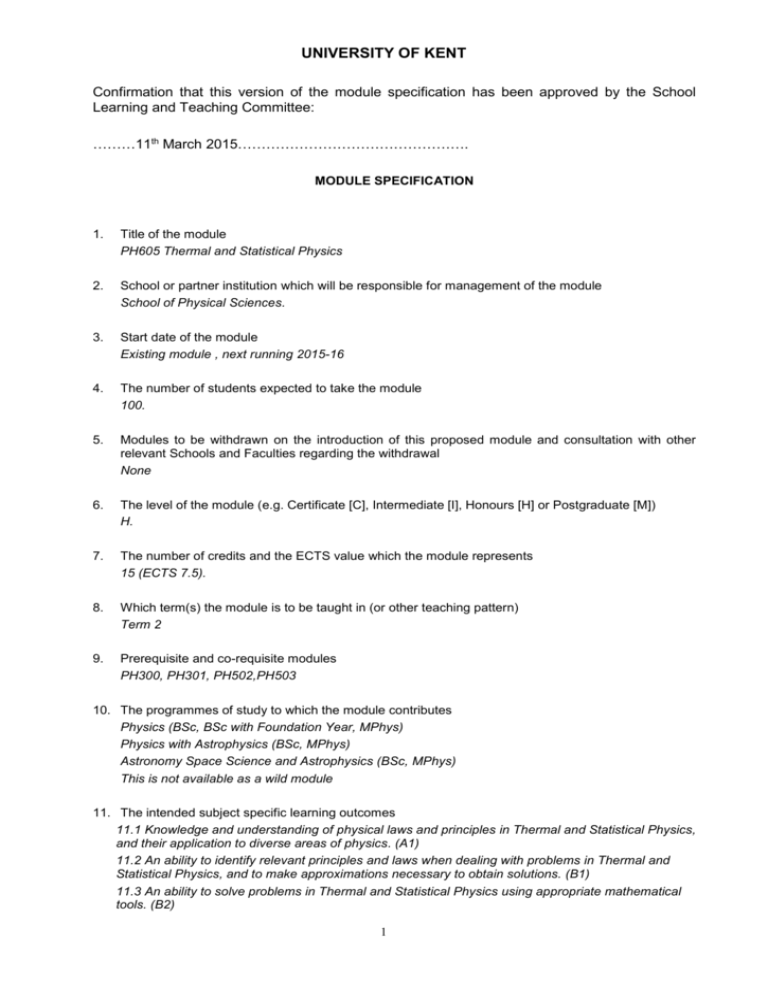
UNIVERSITY OF KENT Confirmation that this version of the module specification has been approved by the School Learning and Teaching Committee: ………11th March 2015…………………………………………. MODULE SPECIFICATION 1. Title of the module PH605 Thermal and Statistical Physics 2. School or partner institution which will be responsible for management of the module School of Physical Sciences. 3. Start date of the module Existing module , next running 2015-16 4. The number of students expected to take the module 100. 5. Modules to be withdrawn on the introduction of this proposed module and consultation with other relevant Schools and Faculties regarding the withdrawal None 6. The level of the module (e.g. Certificate [C], Intermediate [I], Honours [H] or Postgraduate [M]) H. 7. The number of credits and the ECTS value which the module represents 15 (ECTS 7.5). 8. Which term(s) the module is to be taught in (or other teaching pattern) Term 2 9. Prerequisite and co-requisite modules PH300, PH301, PH502,PH503 10. The programmes of study to which the module contributes Physics (BSc, BSc with Foundation Year, MPhys) Physics with Astrophysics (BSc, MPhys) Astronomy Space Science and Astrophysics (BSc, MPhys) This is not available as a wild module 11. The intended subject specific learning outcomes 11.1 Knowledge and understanding of physical laws and principles in Thermal and Statistical Physics, and their application to diverse areas of physics. (A1) 11.2 An ability to identify relevant principles and laws when dealing with problems in Thermal and Statistical Physics, and to make approximations necessary to obtain solutions. (B1) 11.3 An ability to solve problems in Thermal and Statistical Physics using appropriate mathematical tools. (B2) 1 UNIVERSITY OF KENT 11.4 An ability to use mathematical techniques and analysis to model physical behaviour in Thermal and Statistical Physics. (B4) 11.5 An ability to present and interpret information graphically. (C2) 11.6 An ability to make use of appropriate texts, research-based materials or other learning resources as part of managing their own learning.(C6) 12. The intended generic learning outcomes 12.1 Problem-solving skills, in the context of both problems with well-defined solutions and openended problems. Numeracy is subsumed within this area. (D1) 12.2 Analytical skills – associated with the need to pay attention to detail and to develop an ability to manipulate precise and intricate ideas, to construct logical arguments and to use technical language correctly. (D4) 13. A synopsis of the curriculum 1. Thermodynamics Review of zeroth, first, second laws. Quasistatic processes. Functions of state. Extensive and intensive properties. Exact and inexact differentials. Concept of entropy. Heat capacities. Thermodynamic potentials: internal energy, enthalpy, Helmholtz and Gibbs functions. The Maxwell relations. Concept of chemical potential. Applications to simple systems. Joule free expansion. Joule-Kelvin effect. Equilibrium conditions. Phase equilibria, Clausius-Clapeyron equation. The third law of thermodynamics and its consequences – inaccessibility of the absolute zero. 2. Statistical Concepts and Statistical Basis of Thermodynamics Basic statistical concepts. Microscopic and macroscopic descriptions of thermodynamic systems. Statistical basis of Thermodynamics. Boltzmann entropy formula. Temperature and pressure. Statistical properties of molecules in a gas. Basic concepts of probability and probability distributions. Counting the number of ways to place objects in boxes. Distinguishable and indistinguishable objects. Stirling approximation(s). Schottkly defect, Spin 1/2 systems. System of harmonic oscillators. Gibbsian Ensembles. Canonical Ensemble. Gibbs entropy formula. Boltzmann distribution. Partition function. Semi-classical approach. Partition function of a single particle. Partition function of N non-interacting particles. Helmholtz free energy. Pauli paramagnetism. Semi Classical Perfect Gas. Equation of state. Entropy of a monatomic gas, Sackur-Tetrode equation. Density of states. Maxwell velocity distribution. Equipartition of Energy. Heat capacities. Grand Canonical Ensemble. 3. Quantum Statistics Classical and Quantum Counting of Microstates. Average occupation numbers: Fermi Dirac and Bose Einstein statistics. The Classical Limit. Black Body radiation and perfect photon gas. Planck’s law. Einstein theory of solids. Debye theory of solids. 14. Indicative Reading List Thermal Physics, R. Baierlein, Cambridge University Press (1999) (E-Book 2012) Statistical Physics, F. Mandl, John Wiley (2010). Statistical Physics, A. Guenault, Springer (2007). 15. Learning and Teaching Methods, including the nature and number of contact hours and the total study hours which will be expected of students, and how these relate to achievement of the intended module learning outcomes Contact hours: lectures (30 hours), revision sessions (2 hours) Total study time 150 hrs (including private study time) Achievement of module learning outcomes: Lectures (11.1-11,5) Revision sessions and self-study (11.1-11.6, 12.1, 12.2) 2 UNIVERSITY OF KENT 16. Assessment methods and how these relate to testing achievement of the intended module learning outcomes Coursework 30% including class tests Final (written, unseen, length 2 hours) exam 70% The above assessments test students’ knowledge and understanding of laws and principles (11.1, 11.2, 12.2) and application of techniques to model behaviour and solve problems (11.3, 11.4, 11.5, 12.1, 12.2). In preparing for the assessments, students will need to manage their own revision using reference materials (11.6, 12.2). 17. Implications for learning resources, including staff, library, IT and space None 18. The School recognises and has embedded the expectations of current disability equality legislation, and supports students with a declared disability or special educational need in its teaching. Within this module we will make reasonable adjustments wherever necessary, including additional or substitute materials, teaching modes or assessment methods for students who have declared and discussed their learning support needs. Arrangements for students with declared disabilities will be made on an individual basis, in consultation with the University’s disability/dyslexia support service, and specialist support will be provided where needed. 19. Campus where module will be delivered: Canterbury. 3
